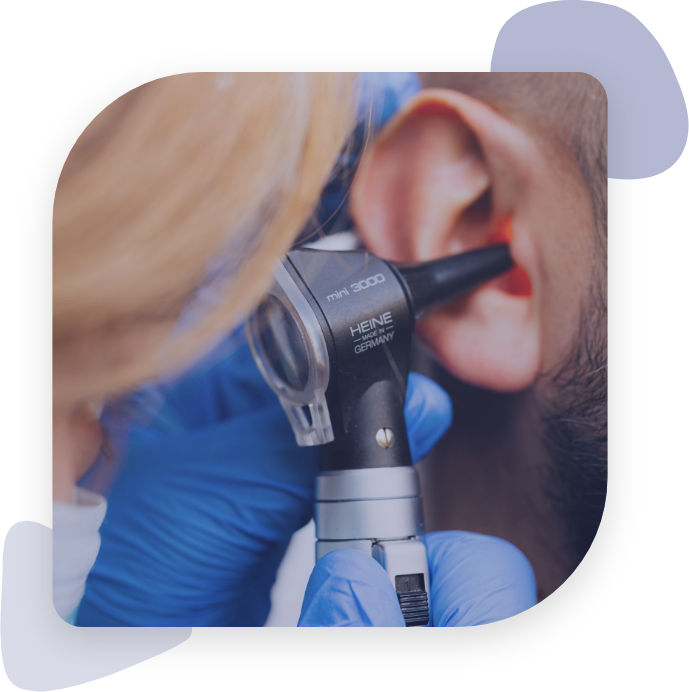PA Center for Hearing and Balance Audiology Services
Hearing Services in Springfield, PA

Audiology Best Practices
Hearing Tests
Tinnitus Evaluation
Tinnitus is a ringing or buzzing sound in your ears that no one else can hear. We provide expert tinnitus evaluations in Springfield, PA. During this evaluation, our audiologist will test your hearing and ask questions about the sounds you hear. This helps us understand your tinnitus better and find the best ways to help you. Our goal is to make the ringing or buzzing less bothersome so you can feel more comfortable.
If tinnitus isn’t treated, it can get really annoying and make it hard to concentrate, sleep, or hear other sounds. Some people may feel stressed or anxious because of the constant ringing. Seeing an audiologist can really help and make you feel better.
Ear Wax Removal
Real Ear Measurement
The tool used is called a probe microphone. It’s a small device that measures sound inside your ear while you wear your hearing aids, helping the audiologist make the right adjustments.
PA Center for Hearing and Balance use real ear measurements to make sure your hearing aids give you the best hearing possible.
OtoScan - 3D Ear Scanning
Hearing Aid Fitting
Hearing Aid Batteries
Vertigo treatment
To make vertigo and dizziness go away, try:
- Doing special exercises to help with balance.
- Taking medicine if your doctor says to.
- Drinking lots of water.
- Avoiding quick head movements.
Our audiologists can show you the best exercises and other ways to feel better.
If you feel vertigo when lying down, try these tips:
- Move slowly when changing positions.
- Sleep with extra pillows to keep your head raised.Try a special exercise called the Epley maneuver, which our audiologists can teach you.
Auditory Processing Disorder Treatment
Improving auditory processing usually includes different kinds of training and exercises, such as:
- Auditory Training: Listening exercises to help the brain understand sounds better.
- Speech Therapy: Working with a speech therapist to improve language skills.
- Environmental Changes: Making rooms quieter, like at home or in the classroom.
- Assistive Devices: Using devices like FM systems to make sounds clearer.
For adults with APD, treatment is similar to children’s but adjusted for adults. It might include:
- Auditory Training Programs: Exercises to help the brain process sounds.
- Communication Strategies: Learning better ways to talk in noisy places.
- Assistive Listening Devices: Using devices to hear better in loud environments.
- Cognitive Therapy: Working with a therapist to improve attention and memory related to listening.
Menieres Disease Treatment
Sudden Hearing Loss Treatment
Sudden hearing loss happens when you lose hearing quickly, usually in one ear. It can happen in a few days or even a few hours. You may wake up one day and find it hard to hear or notice that your hearing gets worse throughout the day. If this happens, it’s important to see a doctor right away.
Doctors often treat sudden hearing loss with medications called steroids. These help reduce swelling in the inner ear and can help improve your hearing. Sometimes, the doctor might give you these steroids as pills, or they might inject them directly into your ear. Other treatments could include hearing aids or therapy to help with balance, especially if the hearing loss affects how you move.
The sooner you get treatment, the better the chance of improving your hearing. If you wait too long, it may be harder to get your hearing back. In some cases, doctors may suggest other tests like an MRI to check for other causes of hearing loss.
Sudden hearing loss can happen because of infections, loud noises, or problems with the inner ear. Sometimes, doctors can’t find a specific cause.
How is sudden hearing loss treated? Doctors usually use steroids to reduce swelling in the ear. They may also suggest hearing aids or therapy if needed.
Hear Better. Live Better.
-
130 S. State Road,
Suite 201 Springfield, PA 19064 -
905 West Sproul Rd,
Suite 201 Springfield, PA 19064 - 610-438-5203
